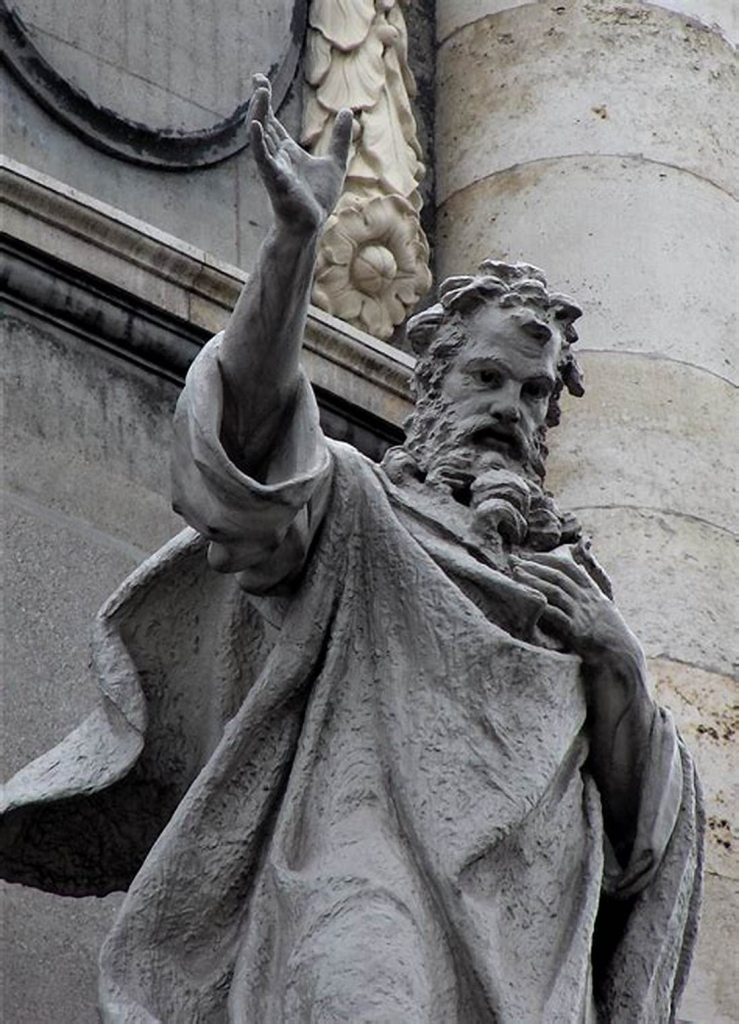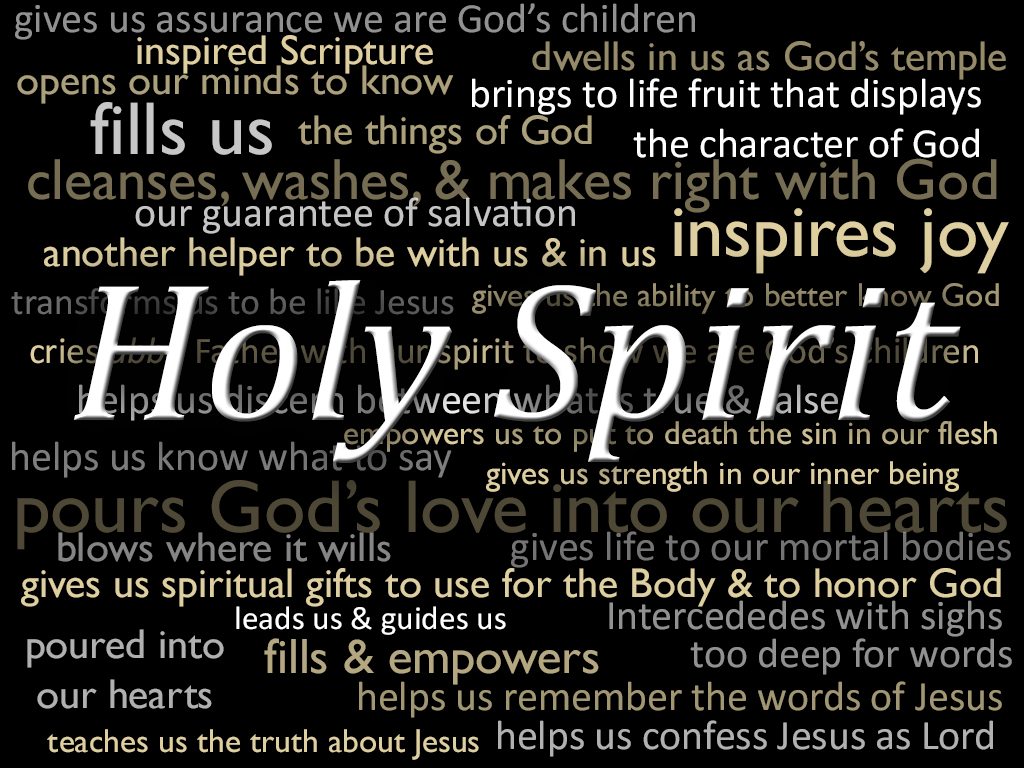“This is a test.” Radio stations are required by the FCC to periodically test their emergency alert system to ensure it is in proper working order before a crisis occurs. They will play the alert sound – that loud, screeching, beeping sound – and then tell their listeners: “This is a test.” I wish they would tell us that upfront. It would save me from a moment of panic.
I thought about that when I read Deuteronomy 13:1-4. Go read it and come back – I’ll wait for you right here.
Deuteronomy is the retelling of the Israelites’ escape from Egypt. The Lord God brought them up out of slavery to bring them into a “good land, flowing with milk and honey” (Ex 3:8). It is also Moses’ final message to the nation he led for forty years. He knows is about to die and he wants to leave them with encouragement and hope and wise instruction. Two thoughts come to my mind about verse .
First, Moses said the Lord was testing the Israelites “to find out whether you love Him with all your heart and with all your soul” (v. 3). I do not think that God was trying to gain previously unknown information. He already knows every man’s heart. John 2:24-25 says, “Jesus knew all men and what was in a man.” I believe that the testing was more for the Israelites’ benefit than God’s.
Second, these testing phases rarely come with a warning. We don’t understand what is happening or why. Job never knew that his hard season was a test to prove something to the devil. He just knew that his life had shattered and he was in misery. The Bible never says that God told Job the whole story. Maybe He did, but it would have been after the fact.
Jesus told His disciples, “You do not understand what I am doing, but later you will understand” (John 13:7). I do not understand why things have turned out as they have but I am hanging my life His promise. Because I know that He is faithful. Beloved, in all the things that don’t make sense, you and I can trust God. As the great Charles Spurgeon said, “God is too good to be unkind and He is too wise to be mistaken. And when we cannot trace His hand, we must trust His heart.”
Grace
Joy asks a thousand questions a day – that’s how she learns and so I try to be patient with the never-ending stream of “Why?” and “What?” and “How?” Yesterday she saw some honeybees in the ligustrum bush and started asking about what they were doing which became how do bees make honey. So after her bath, we surfed YouTube for videos about bees. She loves to learn new things and I love to help her explore the world around her.
But sometimes she asks questions with a different motivation. We have rules in our house that have been in place all her life. They haven’t changed just because she isn’t here all the time anymore. She knows the rules well, but sometimes she will ask the question hoping to catch me off-guard and give her a different answer. I may be old and slow, but I’m no dummy. The rules are the rules.
God gave the Israelites the law – the commandments and regulations that must be strictly observed to maintain a relationship with Him. He is holy and righteous and His people must live holy and righteous lives. The law was given to instruct them in His ways and ensure their standing before Him. But the people failed to keep the law – “Everyone did as he saw fit” (Jud 21:25). Which meant they did not obey God’s law. Man was and is still sinful. Sin demands death. The Israelites relied on animals to die in their place, but that was not enough.
Then Jesus came on the scene. He said that He came to “fulfill” the law and the Prophets – but not to abolish them (Matt 5:17-20). What did He mean? The purpose and demands of the law had not changed. What changed was how one approached God. Under the law, all the rituals and rules – God’s “house rules” – must be followed to a T. But Jesus came “full of grace” (John 1:14). He lived the perfect life that man could not live. And He died to fulfill “every jot and tittle” of the law. Jesus – God in flesh – shed His divine blood to meet the demands of the law. All who receive Jesus’ work are under grace.
That means if you are a believer, you can breathe a sigh of relief because Jesus did all the hard work for you. And He sent His Holy Spirit to live in you and help you live out your holy standing. The rules haven’t changed, but how we obey them has. Beloved, you cannot; but Jesus did. Now you can live in grace.
It’s okay to have questions
Doubt can be dangerous for Christians. Doubt often causes us to distance ourselves from God. Distance leads to disobedience and soon our faith atrophies. God wants us to believe without wavering. But sometimes that’s hard. If anyone should have believed without wavering, it was John the Baptist. Even in the womb, Jesus’ cousin recognized the Lord, leaping at the sound of Mary’s voice (Luke 1: 41-45). John’s whole life was, “to prepare the way for the Lord” (Luke 3:4). He declared Jesus as “the Lamb of God, who takes away the sin of the world!” How did he know? “The one who sent me to baptize with water told me, ‘The man on whom you see the Spirit come down and remain is he who will baptize with the Holy Spirit.’ I have seen, and I testify that this is the Son of God” (John 1:29-34).
Later John asked a big question, “Are you the one who was to come, or should we expect someone else?” (Luke 7:20). What changed? John was in a prison cell after speaking out against the Roman king and his adulterous marriage. He had faithfully proclaimed the coming of God’s Kingdom. He had rebuked the religious elite and the irreligious royals. And rather than blessings, his efforts brought down wrath. He did what God asked of Him and the results were harsh. He would lose his head over it. Can you blame the poor fellow? Haven’t you and I questioned God for less?
With all that he knew, John – weary and discouraged – began to doubt. But Jesus didn’t chastise John. He pointed him back to the evidence. “What do you see, John?” “The blind receive sight, the lame walk, those who have leprosy are cured, the deaf hear, the dead are raised, and the good news is preached to the poor” (Luke 7:22). Look beyond your circumstances, John. You preached the coming of the kingdom of heaven (Matthew 3:1). You spoke of my power (Mark 1: 7). Your own words are being fulfilled in Me. Then He added, “Blessed is the man who does not fall away on account of me” (Luke 7:23).
My questions made me search for answers. And those answers strengthened my faith. Ask your questions Beloved. He will not chastise you. He will give you answers that will ground and strengthen your faith. Jesus not only has the answers, He is the answer.
Mountains and Valleys
A verse in Deuteronomy struck me yesterday. It is tucked in the commands Moses gave the Israelites just before they finally entered the Promised Land. He was telling them how good the land was, “a land flowing with milk and honey” (Deut 11:9). Verse 11 provided a powerful visual for me: “The land you are crossing the Jordan to take possession of is a land of mountains and valleys that drinks rain from heaven.” I realized that mountains and valleys almost always develop together.
Mountains are glorious – tall, majestic peaks that seem to reach up to the heavens. They take our breath away with their beauty and grandeur. Men climb mountains and gaze in wonder at the world below them. Mountains inspire words of prose and songs of awe. My family visited North Carolina several years ago and when we hit the Smokey Mountains I was stunned by their beauty. I’ve seen part of the Rocky Mountains and they are beyond words.
I am sure you get where I’m going. Life is full of both mountains and valleys. And rain. We all want the mountain top experience, but nobody wants to go down into the valley. We want to scale the heights with the Lord. We want to gaze in awe and wonder from that high place. But the valley is where the rain soaks in and nurtures the ground so that there is growth and fruitfulness. Some of the most stunning flowers grow in the shade of the valley.
I have been through many valleys. The truth is, I am in one right now. But if my experience has taught me anything it is that the green pastures and the quiet waters are down in the valley (Psalm 23:1-2). The valley is where we learn to walk with God and trust Him day-by-day. It is where we can most clearly see God’s goodness and mercy (Psalm 23:6).
Here is something else that spoke to my heart. Moses said, “It [the Promised Land] is a land the Lord your God cares for; the eyes of the Lord your God are continually on it . . .” (Deut 11:12). David said, “Even though I walk through the valley . . . You are with me” (Psalm 23:4). God watches over His children in the valley – He walks with us and comforts us.
Yes, the valleys are hard, but that is where we grow closer to God. When you and I are in the valley, Beloved, let’s plant some seeds of faith and hope and watch them bloom.
Identity
“Who am I?” “What is my identity?” Identity is the big push in our culture. But that’s nothing new. In the sixties wives and mothers were walking away from their families to “discover myself.” As psychology took a firm grip in the seventies, “knowing ourselves” became the cultural cry. I’m not sure we ever discovered anything worthwhile, we just turned all of our attention inward and brooded.
But identity is not entirely a bad thing. I believe it is important to understand who we are. Identity that recognizes one’s gifts and talents can encourage a lifelong goal. I was advised years ago by a wise friend to consider myself a writer and it spurred me to take writing seriously. We encourage Joy to think of herself as a dancer, a worship leader, or a preacher as she shows interest in all of those things. Yesterday she was a circus performer doing tricks on her trapeze. She is at that fun stage of self-discovery.
But identity has also become sorely twisted by the world as many allow sexuality or fantasy to shape who they are. Men choose to identify as women and women choose to identify as men – or as neither. High school students are identifying as animals. “This is who I am! You must accept me and accommodate me in my identity!” Worst of all, laws are being enacted demanding that the rest of us go along with their delusions.
The church is no exception. “Who I am in Christ” is a major theme in religious circles. It permeates popular Christian music and studies. It is big business for producers of kitschy Christian wall art, coffee cups, and t-shirts. Mind you, it’s not a bad thing for us to recognize that we are loved, saved, redeemed, chosen, blood-bought children of God. It really does give us Joy and hope and peace. As long as we remember why we are who we are.
I am loved because “God is love” (1 Jn 4:16). I am saved because the name of Jesus has power to save (Acts 4:12). I am redeemed because God is merciful (Rom 9:16). I am chosen because the Lord is gracious (Eph 1:11). I am a child of God because He claimed me as His own (1 Jn 3:1). I know who I am in Christ because my identity is Him. Don’t look within to find your identity. Look to the One who claimed you and saved you and made you His own. That, Beloved, is who you are.
Church History: Fathers of the Faith
My desire in this church history study is to teach you how the Holy Spirit moved over human history to build Christ’s Body and introduce you to the people He used along the way.
When the church began its westward movement it took deep root in Rome and then slowly moved toward France. One of the most prolific ancient Fathers, Bishop Irenaeus, ministered in Lyons and left a wealth of Christian writings. Irenaeus was firmly orthodox. He lived in a time (the second century) when false interpretations of Jesus were rampant. Not only did he defend the biblical Jesus and fight for authentic Christianity, but Irenaeus was instrumental in establishing the canon of scripture we know as the New Testament.
Canonicity means the collection of sacred writings which were accepted by the church as authoritative and true. Irenaeus argued for specific requirements in determining which writings would be included in the Christian manifesto: agreement with direct apostolic teaching, prophetic revelation, and early creedal statements. He eschewed fantasy and mythology, relying instead on eyewitness accounts of Jesus’ works and the works of His followers in the first century.
Irenaeus was a “third-generation” Christian. He was a disciple of Polycarp who was a disciple of John. He sat at the feet of the man who sat at the feet of the man who sat at the feet of the Lord Jesus. He endured fierce persecution in Lyons, taking the office of bishop after his predecessor’s death due to abuse. He was held in highest esteem by the churches of that era and lived up to his name as a peacemaker in an era of great doctrinal turmoil while still defending the orthodox Christian teaching against Gnostic heresies. Irenaeus argued that salvation had nothing to do with intellect or secret knowledge but was solely rooted in the work of Jesus.
By the end of the third century, the church had moved into Spain and Britain, then headed south into North Africa where Christianity was well-received and fruitful. North African churches were the first Latin-speaking churches in the world. Just west of Egypt was the town of Cyrene. The man who was drafted to carry Jesus’ cross was Simon of Cyrene (see Mark 15:21). It is almost certain that Simon became a believer and returned home to share the gospel. Simon’s son, Rufus was highlighted in Paul’s list of fellow Christians in Romans 16. By the end of the third century, the vast Roman empire was replete with gospel proclaimers.
What does that mean for you and me in the twenty-first-century church? Just that the seeds of the gospel were planted some two thousand years ago and they are still growing and still producing fruit for the Kingdom of God. When you and I tell the old, old story, Beloved, we are standing on the fields where Irenaeus and others went before.
Doctrines of the Faith: The Spirit in You
he Holy Spirit is one of the least-known persons of the Holy Trinity. He is not as “visible” in the Scriptures, but He is all over the scenes and people of the Bible. We know He works continually to advance the Kingdom of God in the world. But how does He work in the believer? Here is a very small sampling.
The Spirit enables us to know the truth about God. 1 John 5:6 says, “It is the Spirit who bears witness because the Spirit is truth.” The Spirit is the conduit of Truth. He imparts truth and opens our hearts and minds to receive it.
The Spirit enables us to serve God. Paul said, “There are different kinds of gifts, but the same Spirit. There are different kinds of service, but the same Lord works all of them in all men” (1 Cor 12:4-6). The good works we do for God are initiated by the Spirit, empowered by the Spirit, and brought to completion by the Spirit.
The Spirit is the evidence that we belong to Christ. John declared, “This is how you can recognize the Spirit of God: Every spirit that acknowledges that Jesus Christ has come in the flesh is from God. If anyone acknowledges that Jesus is the Son of God, God lives in him and he in God.” (1 John 4:2, 15). The Spirit also produces fruit in our lives which is further evidence that we belong to Christ. “Love, joy, peace, patience, kindness, goodness, faithfulness, gentleness and self-control” (Gal 5:22-23). These fruits reflect the character of God and are only possible when we are surrendered to Christ and filled with His Spirit.
The Spirit is our Teacher: “The Holy Spirit, whom the Father will send in my name, He will teach you all things, and bring to your remembrance all that I said to you.” (John 14:26). He instructs us as we study the Scriptures and helps us put into practice what we’ve learned.
The Spirit is our “prayer partner.” He prays for us when we cannot pray for ourselves: “The Spirit helps us in our weakness. We do not know what we ought to pray for, but the Spirit Himself intercedes for us with groans that words cannot express,” (Rom 8:26). I have depended on the Spirit so many times when I couldn’t find the words to express my heart.
The Holy Spirit is vital for the Christian. In fact, if you do not have the Spirit you are not a Christian (Rom 8:9). Beloved, you can’t do this Christian life without Him. Thankfully you will never have to.
It’s okay to not be perfect
I never considered myself a perfectionist until I started back to school. Suddenly every assignment and every course had to be an “A.” The first B I got felt like a total failure. I expected to be perfect.
I find it interesting that while the Bible uses the word “perfect” just forty-two times, the word “good” appears more than six hundred times. After completing each day’s creative work, God examined what He had done and “saw that it was good.” In the original Hebrew, this means that God found His work “pleasing, favorable, and satisfactory.” Think about it – if God, at the zenith of His creative work, was content with “good” shouldn’t “good” be good enough for us?
There’s more: He promised a good land to the Israelites when they escaped Egyptian bondage (Ex 3:8). Jesus said the Father gives “good gifts” (Mat 7:11), He proclaimed the soil with the greatest harvest good (Luke 8:8) and Paul tells us to “overcome evil with good” (Rom 12:21) – not perfection. Even the Gospel that saves us is called “the Good News” (Acts 5:42). Why then are we trying so hard to be perfect?
God didn’t saddle us with this obsession for perfection – it was the enemy who planted that impossible seed. But we have watered and nurtured it until it has become a weed of gigantic proportions and, as weeds so often do, it has choked the life out of us and the “good works” we were created to do (Ephesians 2:10). It’s his way of keeping us distracted, dissatisfied, frustrated – and fruitless. Perfectionism will drive us to the point of exhaustion as we push ourselves to reach for an unreachable standard. Or, on the flip side, it will leave us in a state of paralysis, fearful of even attempting anything because we know we’ll never measure up. I’ve been both – and it’s no way to live. You and I will never pull off perfection this side of heaven. And that’s okay.
Only God is perfect and making you perfect is His work alone, through the blood of Jesus and the power of the Spirit. But you won’t see the perfectly finished product until you stand before Him in heaven. So hang all your perfectionist tendencies on Him and be free from that burden you were never meant to carry. Beloved, being good is good enough.
When the Rooster Crows
Have you ever noticed how hard it is to recognize sin in the moment? Peter sat in the courtyard outside of the place where Jesus was being tried, and three times denied his association with the One whom he had sworn just hours before to never abandon. It wasn’t until the rooster crowed that Peter woke out of his sin stupor and realized what he had done. And it broke his heart. Oh, Jesus had tried to help him. He warned him when they stood on the Mount of Olives: “Before the rooster crows, you will disown me three times” (Matthew 26:34) and again in the Garden: “Watch and pray so that you will not fall into temptation. The spirit is willing but the flesh is weak” (Matthew 26:41).
The flesh wants what the flesh wants. It doesn’t care about your spirit when temptation dangles like a carrot on a stick. Or an adult website. Or an attractive coworker. It will rise up in you and me and take control. There’s something about the lure of sin that dulls our spiritual senses and makes it easy for our weak flesh to fall for the bait. In that moment we’re only thinking of pleasure. It’s after we have spent ourselves for sin, that we wake up and realize what we’ve done. Which is what Peter did when he heard the rooster’s call. He suddenly remembered Jesus’ dire prediction and “he went outside and wept bitterly” (v. 75).
It’s no wonder that Peter later wrote, “Be self-controlled and alert” (1 Peter 5:8). He learned the hard way the necessity of being sober and vigilant. The enemy is on the prowl – looking for an opportunity to take you and me down. He knows your vices, he knows my weaknesses and he takes full advantage of them.
Paul, under the leadership of the Holy Spirit, said we must be aware of the devil’s schemes (Eph 6:11) and look for the way out of temptation (1 Cor 10:13) – and there is always a way out. The problem is most of us are looking for the way in. When the Bible says “Flee evil desires” that means you get away from the temptation. You don’t stand there and toy with it. You will fall every time.
I confess I am by no means an expert on resisting sin, but I know Someone who is and His advice is to “Watch and pray.” And run away. Beloved, don’t let the rooster crow on you.
Yes, Jesus Loves Me
I was blessed to attend a Bible study group this week for the first time. As a teacher, it is a rare treat to have someone pour into me for a change. The worship was uplifting, the fellowship was sweet, and the message was timely: the Love of God. The speaker took us through several of the attributes of God’s love and she ended by leading us all through “Jesus Loves Me.” Yes, that is a sweet little song we teach to our children, but let me assure you, it is equally applicable to adults. There is something specials about singing that song with a group of seasoned ladies who have leaned on God’s love through the highs and lows of life.
But something interesting happened. Did you know that there are more verses to that song than we teach our babies? Do you know the words to all those verses? I don’t and neither did most of the ladies there. So we Googled the song. We all knew the first verse – no problem. And we all referred to our phones for the second verse – still good. And then we came to the third verse and we were not all on the same version. Suddenly most of us dropped out and let the leader sing a solo.
What happened? We looked to the world for the words. We trusted the internet to fill in the holes in our song. The lesson was clear to me. Trust no one else but God for truth. Sure it was just a verse in a simple, little song, and the words we pulled up were not blasphemous – they were just not the right words. But words – or rather The Word – matters. Paul urged Timothy to stay in the Scriptures that are the very breath of God (2 Tim 3:14-17). Peter confirmed that the Scriptures are given to man by the Holy Spirit – they are trustworthy and true. They are always the right words.
You may be tired of me beating the Berean drum, but it cannot be stressed enough – always, always, always take everything you hear and everything you read and lay it alongside the Bible and see if it is true (Acts 17:11). Do not take anyone’s word for truth if it does not agree with the living Word of the living God. Too much is at stake to be misled, even by one little, seemingly insignificant word.
Beloved, be a student of the Scriptures. Get to know God’s Word for yourself so that you do not fall for the wrong verse in the song. Because Jesus does love you, and you need to know it.










